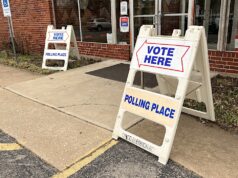Back in November, I wrote an opinion piece discussing access to vision care issues in Oklahoma in the wake of State Question 793’s narrow defeat.
I argued the institutional interests who had opposed SQ 793’s constitutional proposal — chiefly the Oklahoma Association of Optometric Physicians — should ask and answer a simple question: “If SQ 793 was not the appropriate pathway to improving Oklahomans’ access to life-changing vision care, what can we do in 2019 to help our fellow citizens?”
It turns out that they did just that.
Signed by Gov. Kevin Stitt, SB 100 from Senate Floor Leader Kim David (R-Porter), Rep. Carl Newton (R-Cherokee) and other co-authors loosens previous locational restrictions on the sale of eyewear and the practice of optometry. It also defines rules for contact lens assessments and other practice regulations related to optometry.
From an OAOP press release May 21:
(SB 100) removes from statute a prohibition on the sale of eyewear in non-medical, retail settings. It would allow retail stores to sell frames and lenses. It would also allow retail stores to lease space to optometrists. However, unlike previous proposals (including the previously rejected State Question 793), SB 100 contains vigorous protections for patient safety, quality of care, and the independence of the doctor.
Likewise, a Facebook post from CMA Strategies — the local political firm has represented Walmart in its efforts to authorize optical care in its stores — praised the bill on the same day. The group called SB 100 “a win” for Oklahoma:
We routinely have bills become laws, but this one is a bit different. We were able to put together a team that took on an issue that has historically been challenging and made it a law. After 10 years of effort and a state question campaign that brought the issue to the public’s attention, more affordable and accessible eye care will become a reality. We look forward to our client, Walmart, helping their customers live better because of this change.
Positive compromise, even with slow rollout
When longtime foes like Walmart and the OAOP come together and reach a mutually-agreeable compromise in the best interest of Oklahomans, it’s worth tossing out some “atta-boys.”
For me personally — as someone who urged those groups and lawmakers to find a way to improve access to vision care — I felt it was important to write and publish that praise here, especially as I avoided covering SB 100 during session because I had written an opinion piece on the topic in November.
Just how the new co-location rules play out will remain to be seen — for a while. Starting Nov. 1, stores like Walmart and Costco will be able to lease space to optometrists in counties with a population of at least 300,000, meaning Oklahoma, Tulsa and (perhaps soon?) Cleveland counties.
Starting Nov. 1, 2024, the option will be available in counties with at least 130,000 in population, meaning Canadian and Comanche. The new law stairsteps slowly, with statewide implementation not scheduled to take effect until Nov. 1, 2042.
Big ships take a long time to turn, one would suppose.
Volunteer opportunity for optical professionals
In the meantime, the OAOP and Walmart can keep supporting charitable efforts aimed at meeting the vision care needs of vulnerable Oklahomans. I will be volunteering at the Remote Area Medical free vision, dental and medical care event July 13 and 14 on the campus of Southwestern Oklahoma State University in Weatherford.
As I used to organize RAM events, I know that more optometrists, ophthalmologists, opticians and optical technicians can always be of service in a volunteer capacity.
Combining that event with old foes coming together for a legislative agreement on optometry law reforms, things look a little brighter for Oklahomans needing vision care access.
SB 100’s full language
https://nondoc.com/wp-content/uploads/2019/06/SB100-ENR.pdf” height=”450px” download=”all”]





















